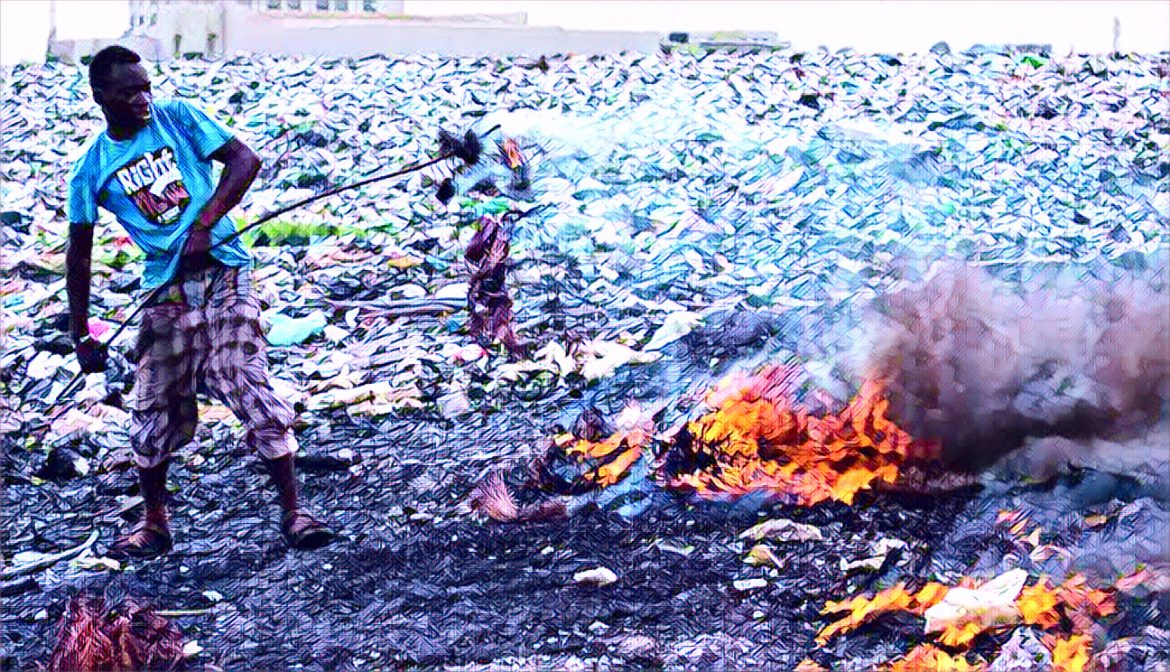Ghana is one of the world’s largest destinations for electronic waste, or e-waste, which is often shipped illegally from Europe and other developed countries. According to the Financial Action Task Force, illicit waste trafficking generates around US$ 10 billion to US$ 12 billion worldwide every year, and Ghana plays a major role in this market.
However, not all of the e-waste that arrives in Ghana can be recycled or repaired. Much of it ends up in dumpsites like Agbogbloshie, near the capital Accra, where it is burned or dismantled by informal workers who risk their health and the environment for a meager income.
The burning of e-waste releases toxic chemicals such as polyvinyl chloride and brominated flame, which can cause pollution-related diseases and contaminate the soil and water. The workers, many of them children and young adults, are exposed to these hazards without adequate protection or regulation.
The trade-in e-waste is driven by a combination of factors, including legal loopholes, corruption, lack of enforcement, and economic necessity. Both Western and Ghanaian companies benefit from exploiting the gaps in international and national laws that allow them to label genuine waste as recycling or second-hand goods.
The Basel Convention, which Ghana has ratified, is a global treaty that aims to protect human health and the environment by regulating transboundary movements and disposal of hazardous waste. However, the convention excludes household waste, which means importing items such as TVs and fridges is legal in Ghana.
The Bamako Convention, which Ghana has not ratified, is a regional treaty that bans all imports of hazardous waste into Africa from non-contracting parties. It also prohibits the import of any waste that the receiving country cannot recycle or dispose of safely.
Ghana’s government has acknowledged the problem of e-waste and passed the Hazardous and Electronic Waste Control and Management Act in 2016 to create a legal framework for more sustainable waste management. It also developed technical guidelines on the handling of hazardous waste under the Sustainable Recycling Industries program.
But these measures have not been enough to curb the illicit trade, which involves government officials, criminal and mafia groups, and corporations. According to Marco Antonelli, a political science professor at the University of Pisa in Italy, European ports do not care much about what is exported from their countries, as long as they control what enters their soil.
He says suspects of pollution crime are rarely charged with organized crime offenses, and the penalties are too low to deter the offenders. He also says there is a need for more cooperation between customs, police, environmental authorities, and prosecutors to fight waste crimes.
For many Ghanaians, importing second-hand items is also a question of survival. The World Bank reports that 27% of Ghana’s population lives in poverty, and e-waste generates jobs and income for thousands of people. Many students rely on used computers that are salvaged from old machines to pursue their education.
James Benjamin Gaisie, from the Ghana Ports and Harbours Authority, says it would be political suicide for the government to ban these computers, as they are seen as a lifeline for many citizens.
But while recycling can have positive impacts on the environment and the economy, hazardous waste trafficking remains a threat. Ghana’s government and exporting countries must ensure that Ghanaians and their natural resources are not held hostage to this illegal business.
There are signs of hope, however. Some initiatives are trying to promote safer and more ethical ways of dealing with e-waste, such as the E-waste Recycling Project, which provides training and equipment to informal workers, and the E-waste Management in Ghana (EMAGIN) project, which aims to create a circular economy for e-waste.
These projects show that e-waste can be a source of opportunity and innovation, rather than a curse, for Ghana and its people.
Source: Daily Maverick




